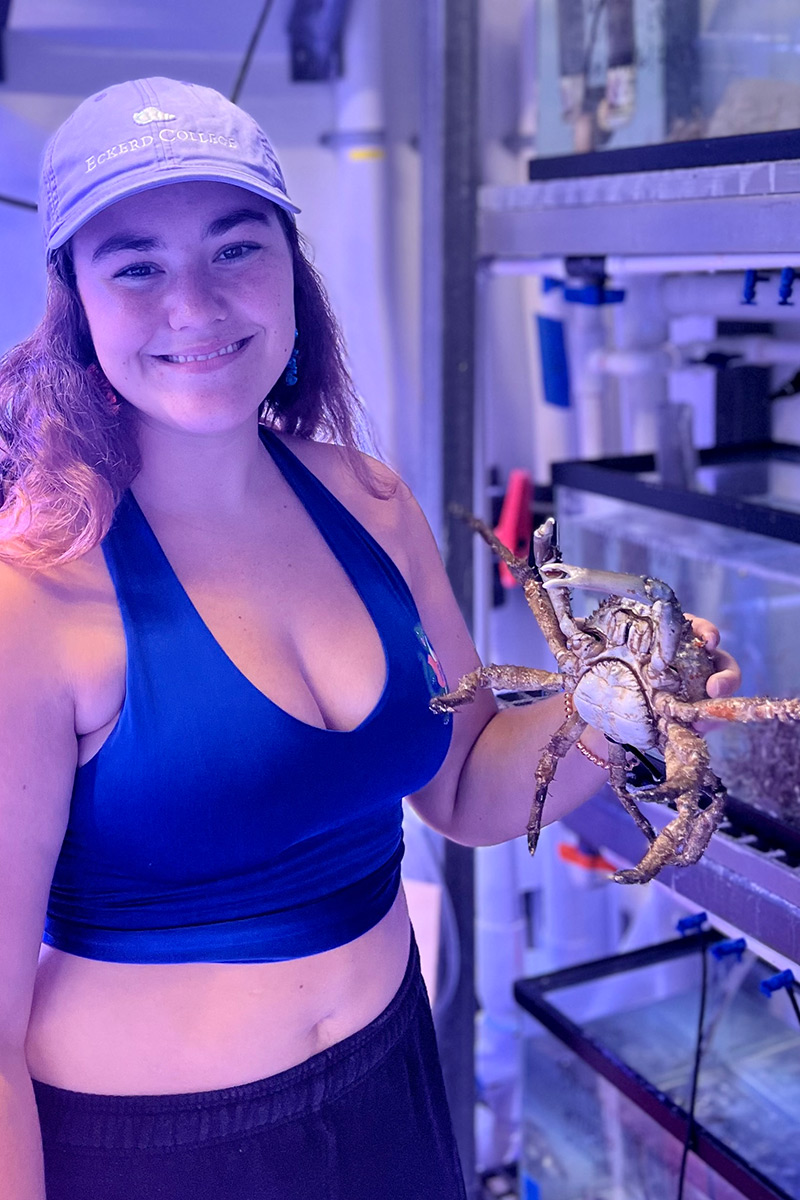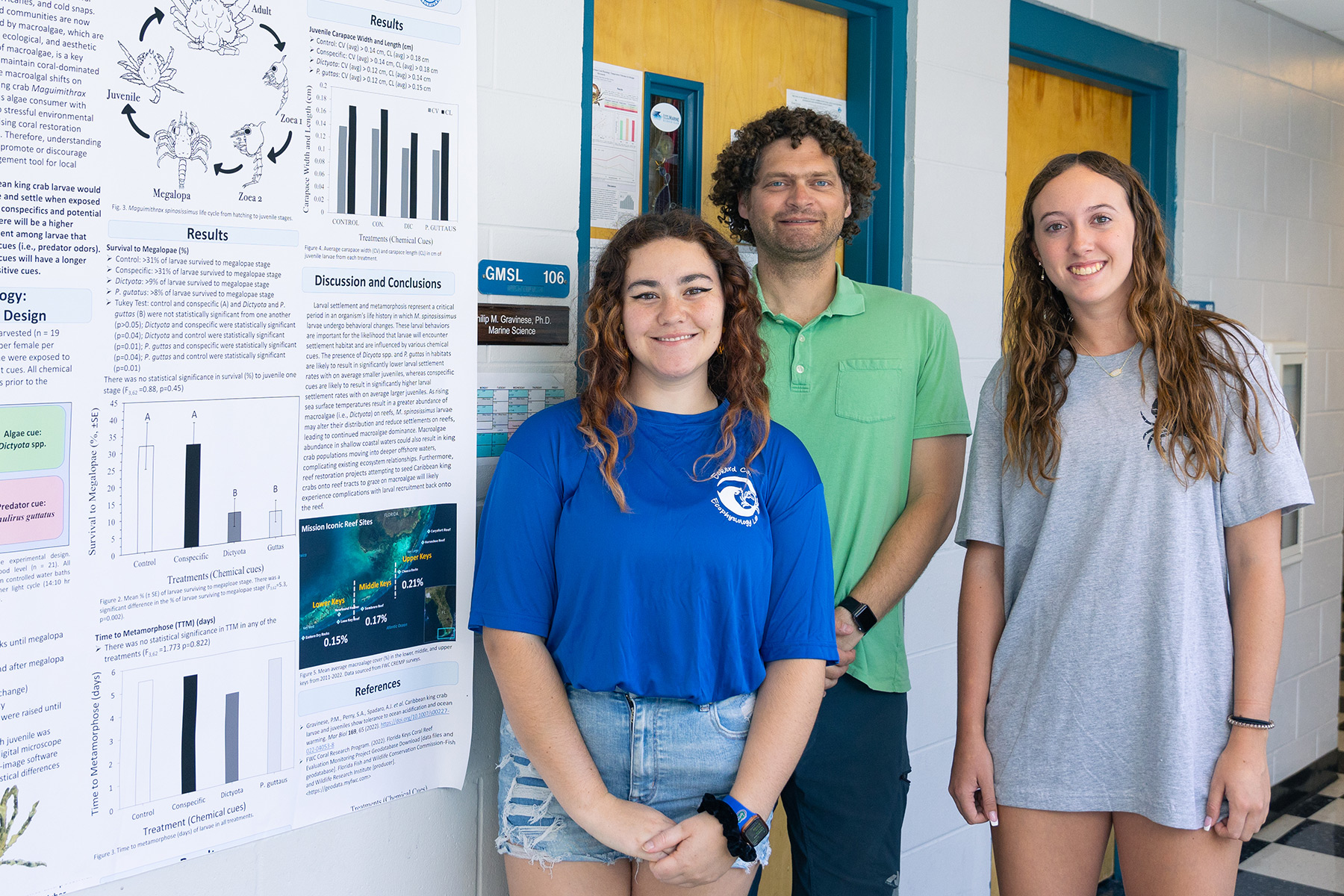Scientists are currently studying whether the Caribbean king crab can be a key factor in the effort to protect the reef systems in the Gulf of Mexico and the Caribbean Sea—systems that have been under siege due to skyrocketing water temperatures and other effects of climate change.
Researchers work around the clock, often in the heat and humidity of the tropical outdoors. But help is on the way. Thanks to a recent $32,000 “Protect Our Reefs” License Plate Grant from Mote Marine Laboratory & Aquarium, Eckerd College Assistant Professor of Marine Science Philip Gravinese, Ph.D., and two of his students will spend more than two months in the Florida Keys this summer trying to find out if the crabs can, indeed, come to the rescue.
The largest native crab species of the Atlantic, Caribbean king crabs can weigh up to 6 pounds and reach a length of more than 7 inches. But what’s important about this species is that the dentition on the tips of a Caribbean king crab claw have evolved to be highly effective at harvesting algae. One of the consequences of warming seas is rampant algae growth, which can mean a death sentence for the reefs.
“The king crab is being considered by the National Oceanic and Atmospheric Administration’s Mission: Iconic Reefs program as a conservation species of interest,” Gravinese explains. “This is because the king crab consumes macroalgae from reefs, which then opens up space for corals to settle. NOAA and Mote are looking to outplant one million of these crabs in the future at Mission: Iconic Reefs sites.
“But we haven’t identified whether the king crab can also physiologically tolerate these warm seawater temperatures. Usually, you want to outplant these crabs during their earlier life stages which can be more sensitive to environmental extremes. We don’t want them to be released and then die off because the water is too warm.”
Gravinese admits that urchins, parrotfish and other marine animals eat algae. But those animals also tend to scrape away at the coral or its foundation; Caribbean king crabs don’t do that.
The Eckerd team will be stationed at Mote Marine’s Elizabeth Moore International Center for Coral Reef Research & Restoration on Summerland Key from May 22 to August 1. “The students will test the physiology of the female king crabs at a control temperature of 82 degrees Fahrenheit and an elevated ‘climate change’ scenario of 91 degrees Fahrenheit—also similar to what we experienced during last summer’s marine heat wave,” Gravinese explains. “To test the physiological effects, we will quantify the females’ lactate and protein levels. We will also determine how their metabolism may change as adults and during larval stages by determining how much oxygen they consume under these scenarios.”
The research effort is important, not just for the environment. NOAA estimates that coral reefs in southeast Florida have an asset value of $8.5 billion—generating $4.4 billion in local sales, $2 billion in local income, and over 70,000 jobs.
To help offset research expenses, the Mote Marine Laboratory created its “Protect Our Reefs” specialty license plate program, which has helped supplement traditional coral reef research and restoration funding sources. Mote makes a substantial proportion of the proceeds from the sale of the plates available through POR grants to build partnerships that support research, education and conservation efforts. Since 2004, the Mote ”Protect Our Reefs” Grants Program has reviewed 433 proposals, and grants have been awarded to 245 projects totaling more than $5.2 million.
While working at the Mote lab, Gravinese will be joined by Taylor Queen, a rising-senior environmental studies and marine science student from Athens, Tennessee, and Gillian Smith, a rising-junior marine science student from Indianola, Iowa. Last summer, Taylor conducted similar research with Gravinese and other Eckerd students at the Mote lab, focusing on stone crabs.
Taylor explains that NOAA is using the king crab to graze down the algae that grow on the coral. She and other researchers want to know how effective that is, and where the effort would be the most successful. “The end game,” she says, “is to know enough about the Caribbean king crab’s behavior and physiology, especially under new climate conditions, to advise coral restoration efforts.”
Taylor is writing her senior thesis about the research. “It’s centered around three main research questions,” she explains. “How chemical cues found in the crabs’ natural environment affect their growth and survival as larvae. These cues include an algae cue, a predator cue, a control, and the cue of an adult Caribbean king crab.
“My second question is looking at the survival and oxygen consumption of larvae under different ocean temperatures, which are modeled after the temperatures currently being seen in the Florida Keys. We’re also looking at the hatching success of the females. My third question will be looking at how different ocean temperatures affect the swimming speed and behavior of the larvae. This can let us know how their population demographics may change as water temperatures increase.
“Last summer everyone [at the lab] was in a panic,” she recalls. “We saw mass bleaching of the coral and more algae growth. The reefs need all the help they can get right now.”
Simply put, Gillian adds, “This research has a chance to protect the environment. And for us, we learn how to run our own research projects and gain confidence in our work. That’s very important as we move ahead.”
The students are dedicated, hardworking, “and so vital to this project,” Gravinese says. “They should be able to generate publishable results and gain valuable experience working at a professional lab at Mote. But it’s work. We check the crabs in shifts; the larvae have to be taken care of and monitored … the animal care takes a lot of time and effort. And without the students’ help, we wouldn’t be able to do it.”
“By funding this project, we are investing in the future health of our reefs, which depend on robust and diverse marine ecosystems,” adds Kevin Claridge, vice president for Sponsored Research & Coastal Policy Programs at Mote Marine Laboratory.















